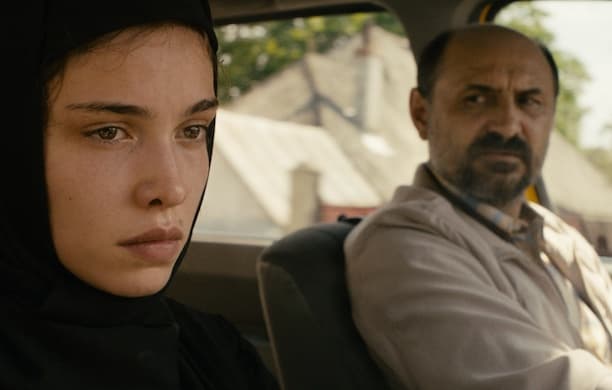Don’t Let Filmmaker Bogdan George Apetri’s Intellectual Cunning Scare You Away From His ‘Miracle’
Apetri doesn’t let idiosyncrasies of taste or style altogether derail what is a curious and involving picture. It is, in fact, a shocking entertainment.

“Miracle,” the most recent effort from the Romanian-born, New York City-based director Bogdan George Apetri, begins as something of a conundrum, perhaps even an annoyance, but — be patient. The enigmas it trucks in are worth attending to.
Like most creative individuals who came of age after 1970, Mr. Apetri is to the postmodern born. That is to say, he’s heir to the reflexive machinations, the irony and self-consciousness, that have influenced — some might say “damaged” — subsequent generations.
“Miracle” is typical in how the nagging recurrence of certain motifs, such as the minutiae surrounding pop radio or philosophical squabbles about the existence of a higher power, is less an organic part of the narrative than a marker of the filmmaker’s intellectual cunning.
Of course, the world is overrun by directors who are too smart for their own good: Wes Anderson, Lars von Trier, and Quentin Tarantino are names that come to mind. That doesn’t mean they don’t make good movies. They do, sometimes, but often the audience is strong-armed too mightily into indulging their quiddities. Art that advertises art can be a hard sell.
Having said that, Mr. Apetri doesn’t let idiosyncrasies of taste or style altogether derail what is a curious and involving picture. “Miracle” is, in fact, a shocking entertainment, a film punctuated with dramatic apercus that are genuinely unexpected and, as such, bracing. This is as true for moments inflected by tenderness as those interrupted by violence.
“Miracle” is centered on two characters: Cristina (Ioana Bugarin), a young novice in a convent situated in rural Romania, and Marius Preda (Emanuel Pârvu), a detective with little patience for police protocol. Their paths cross midway through the film, with Cristina dominating the first half and Preda the second.
The ancillary characters are also odd and testy. Preda’s partner on the force, Misu Macarie (a delightfully clueless Ovidiu Crișan), is as incapable of reading social cues as he is of keeping his mouth shut. At one point, Preda boots him out of the police car a good three miles from a crime scene. His transgression? Fretting about the Lord. As for Dr. Mihăescu (Marian Râlea): He’s cynical, brusque, and voluble in all matters, particularly social progress.
More than a few characters run off at the mouth. Albu (Valeriu Andriuta) picks up a pensive Cristina in his taxi and repeatedly puts his foot in his mouth even while extending sympathy. Then there’s Batin (Cezar Antal), another effusive taxi driver who is the embodiment of consideration … until he isn’t.
Divulging much more of the plot would divest “Miracle” of its considerable power. Mr. Apetri constructs the narrative in a frustratingly piecemeal fashion — the accompanying press materials underline how there are only 42 sequence shots over the course of a two-hour film. Many of the most extended sequences take place within the confines of a car. Compression of space, if not time, is vital to the director’s vision.
Still, frustration is part-and-parcel of the film’s structure. The displacement we experience as an audience is congruent with that felt by the main players. In hindsight, “Miracle” tells a fairly conventional story. While we’re watching it — well, that’s a different thing altogether. It’s the friction between not knowing and retrospect that accounts for the film’s prickly fascination. At no point during the film does Mr. Apetri give the game away.
“Miracle” is also funny. Admittedly, Mr. Apetri’s sense of humor does make a point of flying under the radar. It’s there to glean, all the same, in the awkward interstices of conversation or the way in which the limits of tolerance are breached. The sardonic rules; dryness predominates.
“Miracle’ shouldn’t be sold as a comedy or, for that matter, a procedural drama. It’s very much its own creature, one with a distinct set of foibles, a pointed sense of ambition, and not a little gravitas. Who knows? Maybe, in the end, Mr. Apetri isn’t a postmodernist at all.

